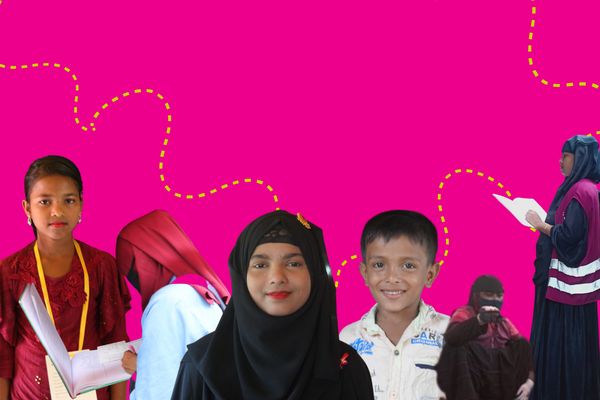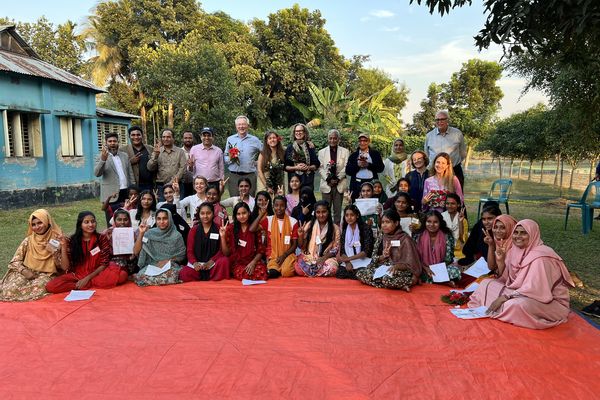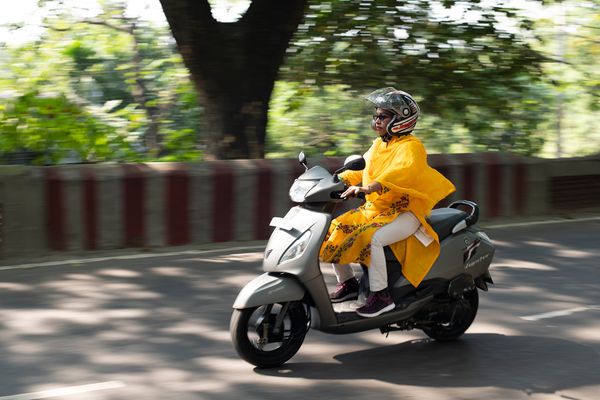On August 25, 2017, hundreds of thousands of Rohingya people began flooding from their homes in Myanmar to Cox’s Bazar, Bangladesh amid unimaginable violence. Today, nearly one million Rohingya refugees are still sheltering in makeshift shelters in the refugee camps.
Everyone deserves a life of security, dignity, and opportunity: But for families who have experienced the unthinkable, even the most basic needs are out of reach. As the organization with the largest response to support refugees in Cox’s Bazar, BRAC will always continue to stand with refugees.
Meet some of the refugees whose resilience and determination are making an impact on their community — and inspiring us every day.
Shamima, Play Leader
“In Myanmar, as a female in the Rohingya community, I was not allowed to work or continue my education independently. Now, I have a job as a Play Leader with BRAC in the Humanitarian Play Lab at my camp. I hope all Rohingya children receive proper, culturally sensitive education to become stronger human beings.” –Shamima
Shamima works with infants through age six, caring for the 50 children that attend her center each day and visiting families in the community. She has worked as a Play Leader for nearly two years! BRAC’s Humanitarian Play Labs provide a safe place for Rohingya children to learn, grow, and heal from the trauma of conflict and displacement.
Muhammed, child at a Humanitarian Play Lab
“I used to be shy, but now I’m not, thanks to the Play Lab. Today, I am attending primary school at a BRAC learning center in Camp 15. I wish to continue my education and promote Rohingya culture to the world.” –Muhammed
Muhammad started attending a BRAC Humanitarian Play Lab as a toddler in 2021. His time at the Humanitarian Play Lab helped him play, learn, and develop critical early childhood skills that helped prepare him for primary school!
Nur, community health worker
“I vividly recall the painful memories of my journey to Bangladesh on November 17th, 2017. The Myanmar army killed many of our relatives and neighbors in our hometown in Mondu, Rakhine State. Fortunately, we managed to escape to Cox’s Bazar, on the other side of the border. I secured a job as a community health worker with the support of BRAC in February 2022. While I enjoy my job, I do not feel at ease here. Our opportunities are dwindling day by day, and we long to return to our own homeland with citizenship and security.” –Nur
Nur, age 20, is a community health worker. After starting with BRAC in 2022, she trained in family planning, primary health care services, and immunizations. Each day she goes door-to-door through the Rohingya refugee settlements to provide basic health information and services, conducts health awareness sessions, and informs pregnant women about emergency services at hospitals.
Raiha, child at a learning center
“I don’t even remember the day my family migrated to Bangladesh from Myanmar, because I was very young at the time. My parents told me that they had to flee here seven years ago because of the persecution by the Myanmar army. Now that I am older, I am studying in fourth grade at BRAC’s learning center. Sometimes, our parents share stories about the atrocities committed by the Myanmar military, but they also encourage us to focus on our studies and move forward. I am determined to continue my education. Having an education will help us live with dignity if we ever return to our country.” –Raiha
Raiha has been a student at a BRAC learning center in the refugee camp, since January 2021. Her family is deeply involved in her education, regularly attending parents’ sessions and discussing the importance of education with her. Learning centers in the refugee camps are open to children ages five through 14, and have recently adopted Myanmar’s curriculum. At the learning center, Raiha studies math, English, Burmese, science, life skills, and social studies, and is taught by Rohingya teachers.
Laila, hygiene promotion volunteer
“My responsibilities have made me a respected and reliable figure in my community. People depend on me for guidance and support, frequently coming to me with their water, sanitation, and hygiene issues, because they trust I can connect them with the proper authorities. I am proud to see the significant changes my work has triggered. Now, my community practices excellent hygiene and has developed a strong sense of ownership over their water, sanitation, and hygiene facilities. I am grateful to BRAC for empowering me and proud of the positive impact I have made.” –Laila
Laila has worked as a hygiene promotion volunteer in her community since 2020, when she trained with BRAC on how to promote healthy water, sanitation, and hygiene practices. Now, she visits other refugee families daily, educating them about essential hygiene practices. She shows families how to properly wash their hands to prevent disease, keep their water clean, and avoid illnesses like diarrhea and dengue. She also meets with her community to help them address challenges related to water, sanitation, and hygiene and how best to maintain facilities, like latrines.
Fatema, solid waste volunteer
“When flowers bloom or vegetables grow in those gardens, I feel proud. I feel like my work has brought happiness to my community. This job has taught me how to manage household waste properly, and now I share this knowledge with neighbors to help keep the community clean and support compost production. This job has also provided much-needed financial stability. Since my husband was killed by the Myanmar military in 2012, I have faced many financial hardships. My role as a solid waste segregator allows me to buy my children their favorite foods and new clothes. It has brought me dignity as a woman and mother and brought positive change to my community.” –Fatema
Fatema, a mother of four living in the refugee camp, joined BRAC as a solid waste volunteer at a waste management plant in 2023. She learned how to identify and safely handle organic, inorganic, hazardous, and residual waste. As a waste segregator, she separates waste generated in the camps, and works with her coworkers to categorize it. Organic waste is composted and transformed into fertilizer for community gardens.
Reporting from Md. Faruk Hossain, Zerin Rahman Sunny, Fazlul Islam, Kanika Das, Asif Al Sadique from Population, Refugees, and Migration (PRM) Project at BRAC’s Humanitarian Crisis Management Programme (HCMP) in Cox’s Bazar, Bangladesh
Edited by Sarah Allen, Communications Manager, BRAC USA



